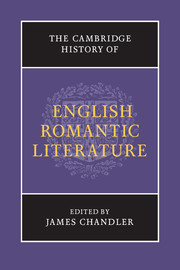Book contents
- Frontmatter
- Introduction
- Part I The Ends of Enlightenment
- Part II Geographies: The Scenes of Literary Life
- 5 London in the 1790s
- 6 Edinburgh and Lowland Scotland
- 7 Romantic Ireland: 1750–1845
- 8 France, Germany, America
- 9 The ‘warm south’
- 10 Country matters
- 11 Romanticism and the wider world: poetry, travel literature and empire
- 12 The homes of England
- 13 Writing, reading and the scenes of war
- 14 Regency London
- Part III Histories: Writing in the New Movements
- Part IV The Ends of Romanticism
- Chronology
- Bibliographies
- Index
- 1 A New Pocket Map of the Cities of London and Westminster; with the Borough of Southwark, Comprehending the new Buildings and other Alterations, 3rd edn (London: William Faden, 1790).">
- References
6 - Edinburgh and Lowland Scotland
from Part II - Geographies: The Scenes of Literary Life
Published online by Cambridge University Press: 28 May 2009
- Frontmatter
- Introduction
- Part I The Ends of Enlightenment
- Part II Geographies: The Scenes of Literary Life
- 5 London in the 1790s
- 6 Edinburgh and Lowland Scotland
- 7 Romantic Ireland: 1750–1845
- 8 France, Germany, America
- 9 The ‘warm south’
- 10 Country matters
- 11 Romanticism and the wider world: poetry, travel literature and empire
- 12 The homes of England
- 13 Writing, reading and the scenes of war
- 14 Regency London
- Part III Histories: Writing in the New Movements
- Part IV The Ends of Romanticism
- Chronology
- Bibliographies
- Index
- 1 A New Pocket Map of the Cities of London and Westminster; with the Borough of Southwark, Comprehending the new Buildings and other Alterations, 3rd edn (London: William Faden, 1790).">
- References
Summary
Enlightenment and Romance
In the century between David Hume’s A Treatise of Human Nature (1739) and Thomas Carlyle’s The French Revolution (1837) Lowland Scotland became one of the advanced centres of European and North Atlantic literary culture. Scottish innovations in moral philosophy, history, the social sciences, rhetoric, poetry, periodical journalism and the novel outweighed their English counterparts in the balance of an emerging imperial world order. The intellectuals of the so-called Scottish Enlightenment – Hume, Adam Smith, Adam Ferguson, John Millar, William Robertson, Lord Kames, Thomas Reid, Dugald Stewart and their peers – developed a new, synthetic account of human nature, social organization, economic activity and historical process in a cosmopolitan or universal order of modernity. At the same time, antiquarian scholars and poets began to invoke the national past, ancestral origins and regional popular traditions in an influential series of attempts to reimagine cultural identity in a post-national age. In the early 1760s, James Macpherson’s collections of the ‘Poems of Ossian’ founded European Romanticism upon a scandalous invention of lost national origins. A quarter-century later, Robert Burns fashioned the first decisively modern vernacular style in British poetry. In the first three decades of the nineteenth century Walter Scott’s historical romances combined those distinctively Scottish inventions, universal modernity and a national past, to define the governing form of Western narrative for the next 100 years. Meanwhile the Edinburgh periodicals – The Edinburgh Review, Blackwood’s Edinburgh Magazine, Chambers’s Edinburgh Journal – recast the main medium of the nineteenth-century public sphere.
Keywords
- Type
- Chapter
- Information
- The Cambridge History of English Romantic Literature , pp. 159 - 181Publisher: Cambridge University PressPrint publication year: 2009
References
- 1
- Cited by

